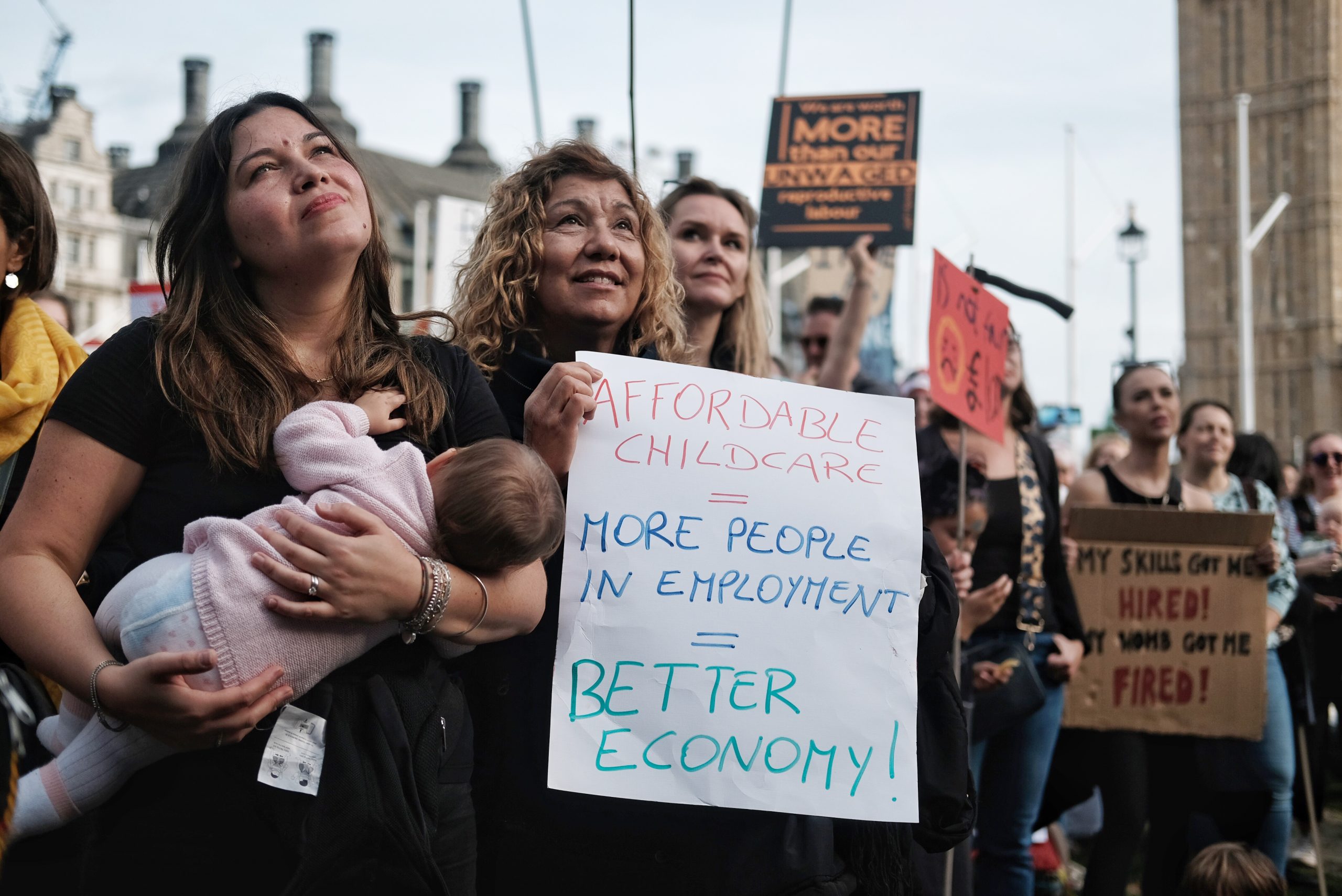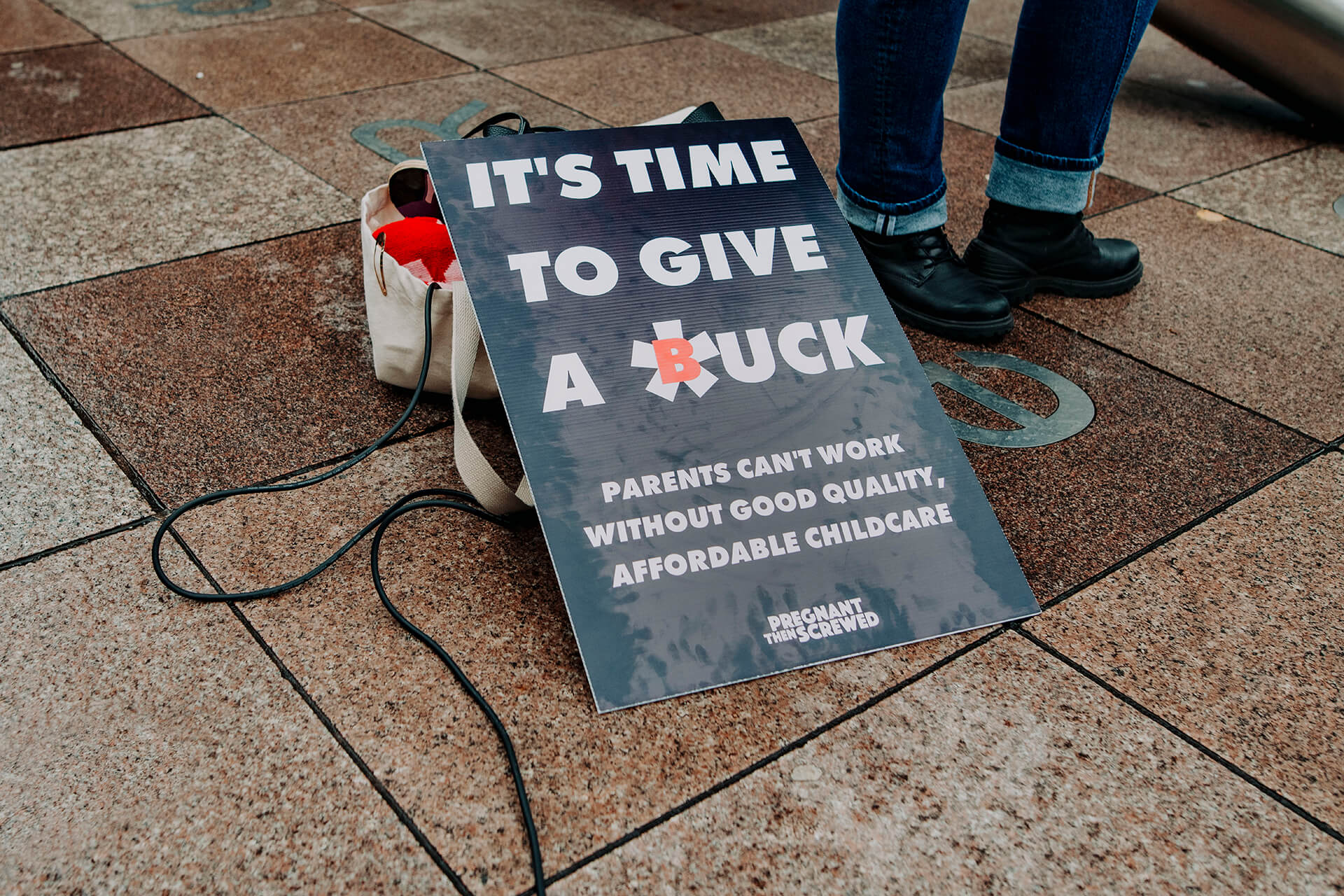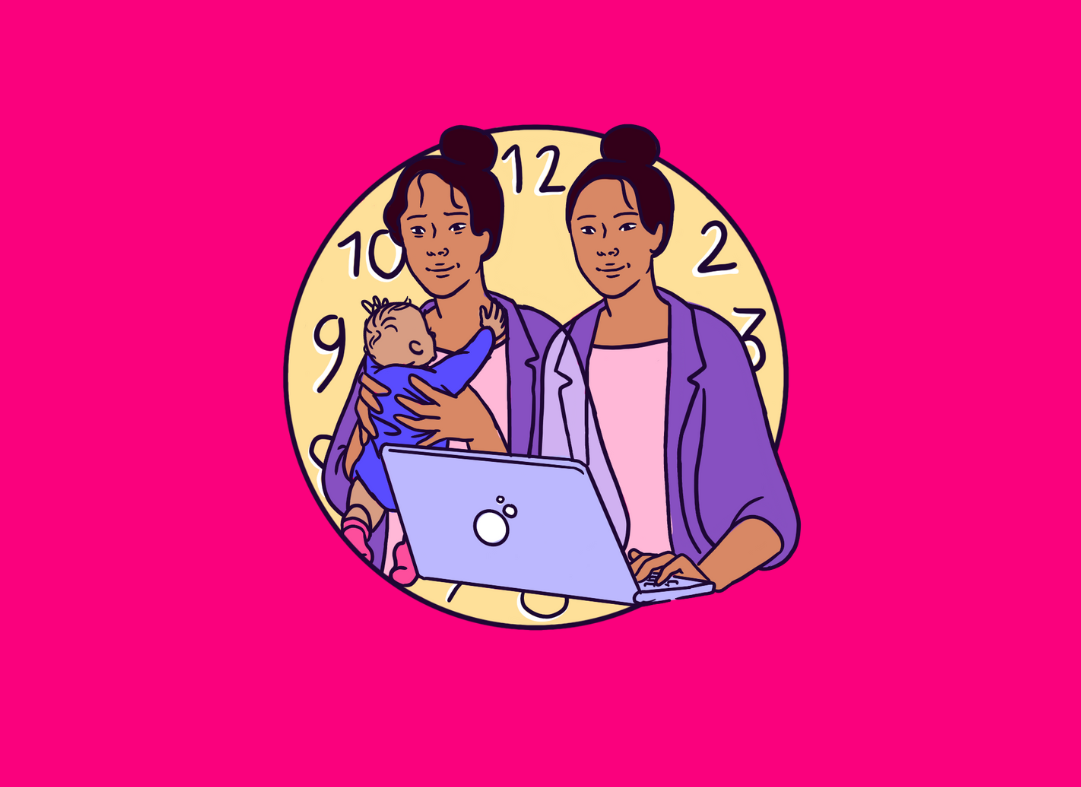Number of parents falling into debt to cover childcare costs up by a third in just 12 months, new figures show
- 45.9% of parents* have been plunged into debt or withdrawn their savings to pay for childcare – a 30% increase from 2023.
- Half (52.5%) of mothers who have had an abortion believe that the cost of childcare was the primary reason for terminating their pregnancy
- Half of single parents* have had to borrow money to pay for childcare
- A third (33.6%) of mothers are unable to return to work full-time due to childcare costs or availability, compared to 11.9% of fathers
- Parents do not believe the Government’s promise that childcare costs will reduce
DATE: 18th February 2024; New research from Pregnant Then Screwed, in partnership with Women In Data®, reveals a sharp increase in childcare debts that parents are facing. 45.9% of parents in England with a child under the age of 5 years old say they accrued debt or had to withdraw money from their savings to pay for childcare – a 30% increase from 35.2% last year.
Pregnant Then Screwed surveyed 35,800 parents. Women In Data® then extracted a nationally representative sample of 5,870 parents to create a 2024 State of the Nation childcare report. Much of the data could be compared directly to the same survey conducted in 2023.
The report has found that 1 in 5 parents (21.5%) with a child under 5 years of age had to withdraw money from their savings and pension to pay their childcare bill, and 37.1% said they had to use credit cards, take out a loan or borrow money from family or friends. The figures rise sharply for single parents with a child under 5 years old, almost two-thirds (66.5%) accrue debt to pay for childcare, including 50% who borrow money, and 31.3% who withdraw money from their savings and pension pot to plug the gaps.
In 2023 the same survey found that 35.2% of parents had to rely on some form of debt, or withdraw money from their savings to pay for childcare. With 27.6% saying they have had to borrow money and 15% saying they have had to withdraw money from savings or their pension
Currently, women retire with a third less in private pension savings than men due to inequalities in the workplace and the knock-on effect of caring responsibilities.
Half of parents with a child under 5 years of age in England (53%) say they spend more than a quarter of their household income on childcare, this is up 16% from last year, whilst 1 in 5 parents (19.2%) say they spend more than half their household income on childcare.
But cost isn’t the only issue. A third (34%) of parents said their childcare provider has a waiting list longer than 9 months and only 13% of parents said there is no issue with childcare availability near them.
The issue of cost and availability continues to have a negative impact on the economy and on gender equality with a third (33.6%) of mothers in England unable to return to work full-time due to childcare costs or availability, compared to just 11.9% of fathers. Meanwhile, 20% of mothers in England are unable to take up a more senior role due to childcare costs and availability compared to 8.8% of fathers.
Joeli Brearley, CEO and founder of charity, Pregnant Then Screwed said: ‘’We’ve not only got a cost of living crisis, we’ve got a cost of working crisis that disproportionately impacts mothers.’’
Worryingly, the cost of childcare continues to price parents out of growing their family, with 85% of parents agreeing with the statement – ‘’I tend to view childcare costs as prohibitive of having more children.’’
Devastatingly, 52.5% of mothers who have had an abortion either somewhat agree or absolutely agree with the statement “I believe that the cost of childcare was the primary reason for me to terminate a pregnancy”
Joeli Brearley, CEO and Founder of Pregnant Then Screwed, said, “We’re running out of babies. The birth rate is in decline. But parents who want to have more children cannot afford to do so. Being a parent is tough enough, but when having more children means sacrificing your income, procreation feels like financial suicide. If we aren’t careful, becoming a parent will be a luxury item, and the economy can’t afford to pay that price.”
The Government has pledged a reduction in childcare costs starting 1st April, however, only 35% of parents in England agreed with the statement, “I think childcare costs will be less of an issue for my family in 2024 due to childcare schemes announced by the Government.” This was reduced to 15% for single parents and 27% for Asian parents. Whilst 90% of parents in England agreed with the statement, “I do not believe the Government’s promise that childcare costs will reduce.” But even when a family is eligible for free hours, and there are places available close by, almost a quarter (23%) of parents said they couldn’t afford to access those hours due to the top up fees charged by nurseries for sundry items such as nappies and food.
Joeli Brearley CEO and Founder of Pregnant Then Screwed comments, “The government has promised parents that they will soon be able to access more affordable childcare, but this will only be successful if the scheme doesn’t bankrupt childcare providers. We’ve already seen that the roll out of the new funding has not been straightforward with many parents still waiting to hear if they will be able to secure a funded place, whilst many others are complaining that cost savings are minimal due to significant price increases for childcare costs outside of the funded hours. It is clear that after years of disappointment, parents are struggling to believe the promise that things will get better.’’
A spokesperson for Women In Data® comments, “Collectively we need to close the gender gap and remove the challenges Women face to achieve equality of opportunities in the workplace and reduce burden of the unspoken ‘tax’ on mothers from additional unpaid labour as carers and in the home.”
ENDS
Notes to editor:
For all media enquiries please contact:
Tel: 07756 525 004
Case studies and interviews are available on request.
About the research:
Survey design, weighting and analysis powered and executed by Women in Data team led by Taisiya Merkulova. A final sample of 5,870 respondents was randomly selected from a pool of 35,800 survey respondents. The sample is nationally representative across the UK population along gender, region, social grade and ethnicity. Weighting is based on the latest census and population estimations published by the ONS, NISRA and NRS.
About Pregnant Then Screwed:
Pregnant Then Screwed exists to end the motherhood penalty. We are the voice of working mothers in the UK. We have a strong and deep connection with our beneficiaries. We provide world-class advice and support to mothers to help them improve their confidence and wellbeing, to give them the tools they need to challenge discrimination in the workplace and to support them to find work that works for them. We advocate for change and raise awareness of the specific challenges faced by working mothers. We challenge deeply entrenched stereotypes about the role of mothers in society. We work with employers, politicians, women and men to make change happen. We publish compelling research to educate, inform and lead the debate.
www.pregnantthenscrewed.com
About Women in Data:
Women in data® is a membership organisation whose mission is to achieve gender parity in the Data and Tech industries. Our objective is to create interventions to attract more female and gender diverse data professionals to the industry and then ensure they are retained to maximise their individual career potential.
Women in Data® together with our partners and the strength of our 60,000 plus community has a measurable, positive impact on pressing industry issues such as sector entry, career advancement, certification, role modelling, pay and inclusion.
Women in Data has become famous for its landmark annual events, which have grown in size and prestige year-on-year, as well as its year–round partner and member support, and its Twenty in Data and Technology annual spotlight on female trail-blazers and rising stars.
www.womenindata.co.uk
Research findings in full:
- 45.8% of parents say that they have had to rely on some form of debt, or they have had to withdraw money from their savings to pay for childcare. With 36.7% saying they have had to borrow money and 21.8% saying they have had to withdraw money from savings or their pension.
- Similar research by Pregnant Then Screwed and Women in Data from March 2023 found that “35.22% of parents say that they have had to rely on some form of debt, or they have had to withdraw money from their savings to pay for childcare. With 27.6% saying they have had to borrow money and 15%% saying they have had to withdraw money from savings or their pension.”
- 35.22% to 45.8% is a 30% increase year on year
- “65.6% of single parents say that they have had to rely on some form of debt, or they have had to withdraw money from their savings to pay for childcare. With 50.5% saying they have had to borrow money and 31.9% saying they have had to withdraw money from savings or their pension.”
- 52.9% of parents say they spend more than a quarter of their household income on childcare. With 19.3% saying they spend more than half their household income on childcare
- “76.8% of parents selected “somewhat agree” or “strongly agree” when asked “To what extent do you agree or disagree with the following statement “I often feel that childcare costs are the same or more than their income”
- “Mothers are more likely than fathers to agree with the statement “I believe that after paying for childcare it doesn’t make financial sense for me to go to work” (70.7% vs 50.4%)”
- “20% of mothers are unable to take up a more senior role due to childcare costs and availability compared to 8.8% of fathers”
- “23.5% of mothers are considering leaving the workforce due to childcare costs or availability”
- “Out of mothers who found the question applicable, 29% are considering leaving the workforce due to childcare costs or availability”
- “85% of parents somewhat agree or strongly agree with the statement “I tend to view childcare costs as prohibitive of having more children”
- “34% of parents somewhat agree or strongly agree with the statement “I often find myself choosing between paying for childcare and household essentials”.
- This increases to 41.4% for Asian parents and 40.7% for Black parents
- “85% of parents somewhat agree or strongly agree with the statement “I tend to view childcare costs as prohibitive of having more children”
- “36.6% of mothers who returned to work after maternity leave had to reduce their hours due to childcare costs or availability compared to 12.4% of fathers”
- “35% of parents in England somewhat agree or strongly agree with the statement “I think childcare costs will be less of an issue for my family in 2024 due to childcare schemes announced by the Government.” This reduces to 15% for single parents and 27% for Asian parents.”
- “90% of parents in England agree with the statement “With a general election happening in 2024, I am worried that the next Government will not reduce childcare costs”
- “90% of parents in England agree with the statement “I do not believe the Government’s promise that childcare costs will reduce”
- “88.5% of parents state that they are likely or very likely to vote for a political party because they have the best childcare pledge in their manifesto with 48.9% stating that they are very likely to do so”
- 13.19% of parents in England with a child under the age of 5 years of age said there is no issue with childcare availability near me
- 23.18% of of parents in England with a child under the age of 5 years of age said Childcare providers are available but I/we cannot afford the top up fees needed to take up free childcare hours we are entitled to
- 14.85% of parents in England with a child under the age of 5 years of age said local Childcare places are available, but they have a waiting list of 3 – 5 months
- 17.03% % of parents in England with a child under the age of 5 years of age said local Childcare places are available, but they have a waiting list of 6 – 8 months
- 13.57% of parents in England with a child under the age of 5 years of age said local Childcare places are available, but they have a waiting list of 9 – 11 months
- 20.61% of parents in England with a child under the age of 5 years of age said local Childcare places are available, but they have a waiting list of at least 12 months
- 3.33% said their local childcare provider had closed in the last 2 years
- 12.34% said their local childcare provider does not open at times they need childcare



